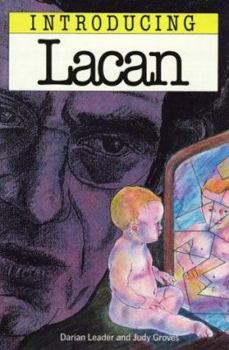Introducing Lacan
(Part of the Graphic Guides Series and Introducing Graphic Guides Series)
Select Format
Select Condition 
Book Overview
Jacques Lacan is now regarded as a major psychoanalytical theorist alongside Freud and Jung, although recognition has been delayed by fierce arguments over his ideas. Written by a leading Lacanian... This description may be from another edition of this product.
Format:Paperback
Language:English
ISBN:1874166315
ISBN13:9781874166313
Release Date:July 1996
Publisher:Icon Books Company
Length:170 Pages
Weight:0.48 lbs.
Dimensions:1.0" x 6.0" x 9.0"
Customer Reviews
4 ratings
For simplicity, the best intro
Published by Thriftbooks.com User , 15 years ago
I'm puzzled at the other reviews; this really is the best place to start with Lacan. It is the Third intro to him I've read. The first was Zizek, which was very interesting, but he explains Lacan in more cultural terms, as Lacan relates to popular culture. Then I read Sean Homer's book, and I was a bit disappointed, in trying to simplify he left me feeling like I hadn't gotten enough info to understand really what Lacan meant with certain terms. This book I loved. Yes, it is simple, but extremely clear. Many of the terms I had previously read about `clicked' with me the way they were presented in this book. Usually I don't write reviews, I would never have bought this, it was given to me, but I am so glad I read it. InsectDesires.com Psychodynamic art.
Good intro to Lacan
Published by Thriftbooks.com User , 17 years ago
I bought this book for a college assigment. IMHO, this book is not a good introduction to Lacan. There are instances, however, in which the author does not explain a concept or an idea at length thus causing you to pause and reread. As I said, it doesn't work as an introduction; don't consider the definitions of concepts, like jouissance for example, as final because Lacan does revisit them and change them in his later seminars. Lacan himself prefers that people read him without knowing anything and that is what you, as a new reader of Lacanian writing, should do. Afterwards come to this book for a simplification of terms. A better title would be Simplifying Lacan.
Simplifying Lacan
Published by Thriftbooks.com User , 22 years ago
Like many, I have struggled with Lacan's "own" words in English translation, sensing ideas of importance that are lost because a) Lacan intentionally obfuscated his ideas to make the very points he wrote about, b) French linguistic play doesn't translate into English, & c) translators vary in quality, in part depending on their audience (e.g., cultural studies, which often misconstrues Lacan as a postmodernist). This book is a wonderful introduction, although I suspect it is of greatest value to someone like myself who has already attempted to fathom Schema L with frustration.For the beginner, I suggest making a try at Lacan himself especially the Seminars, for example, Seminar XI: The Four Fundamental Concepts of Psychoanalysis. After enduring one or two of these, come to this book, and then return to Lacan, who should now seem much more illuminating and witty. You may even understand why Lacan seemed so frustrating to you, which goes to his essential points about what language does for the sense of self.Another strategy is to read any number of works by Slavoj Zizek (for example, Looking Awry, Everything You Always Wanted to Know about Hitchcock), who can slice and dice popular culture in a fun way, all the while with a very lucid understanding of Lacan's ideas. It helps to have one or two videos of Hitchcock handy as you do so.
extremely well written introduction
Published by Thriftbooks.com User , 24 years ago
When you need an introduction to Lacan, buy this and forget the rest. This book has at least three merits. First, the author is an orthodox lacanian psychoanalyst. This advantage could not be overstated. So many books titled so-called "Introduction to Lacan" are written by non-professional (e.g. professors of French, Cultural Studies or literary critic) with some dubious leanings and irredeemable confusions. Those books are rather personal accounts than good introductions for beginner and of no use to understand one of the most difficult writers of all time. Darian Leader's book is different. This book was written by lacanian professional rather than self-appointed "interpreter" of Lacan and supervised by Jacques-Alain Miller, the successor of Lacan. This fact makes the book the most faithful and reliable introduction to Lacan. Second, this book explains the clinical significance and origin of great Lacanian terms, e.g. repetition, sinthome, lalangue, so on. The result is that the approach makes it easy to understand. This is why other books by non-psychiatrist could be by no means competitors. Third, this book is written by exceptionally clear language and aided by intelligent graphics. Clearity is not a Lacanian virtue, but this book makes a immensely satisfying exception.






